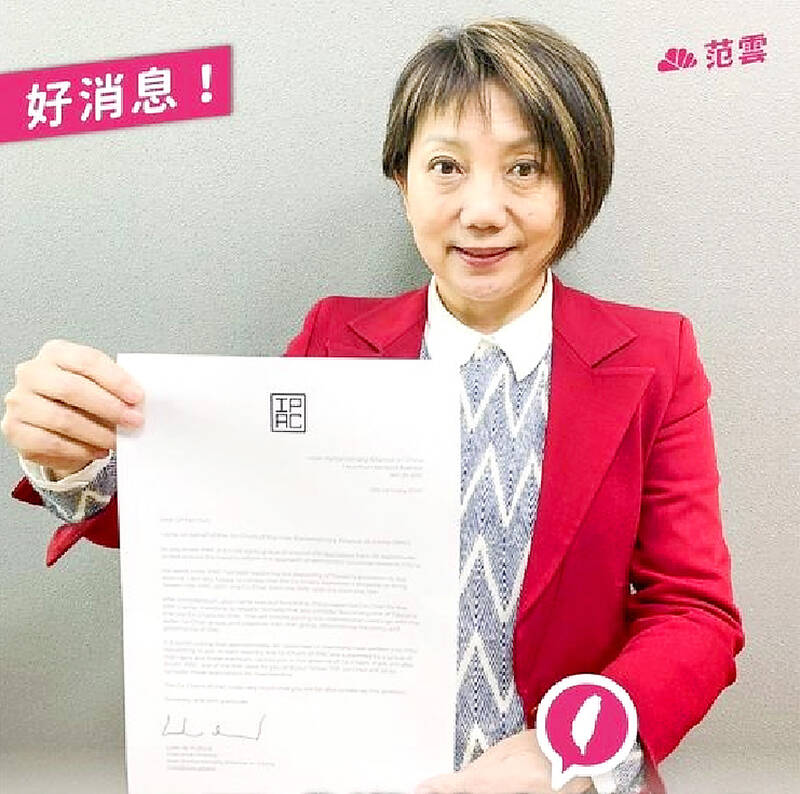Taiwan has been invited to join the Inter-Parliamentary Alliance on China (IPAC), highlighting its key role in resisting Beijing, and that democratic countries want Taipei to join their alliance, Democratic Progressive Party (DPP) Legislator Fan Yun (范雲) said yesterday.
Founded in 2020, IPAC consists of 250 legislators from 30 countries across five continents, who are working to reform how democratic nations approach China.
The alliance must reach a certain degree of consensus regarding which countries can become member states, with two legislators from two different parties on each country’s political spectrum chosen to be cochairs to ensure representativeness, Fan said.

Photo copied by Hsieh Chun-lin, Taipei Times
After passing a resolution, IPAC invited Taiwan People’s Party (TPP) Legislator Jang Chyi-lu (張其祿) and herself to be cochairs representing Taiwan’s legislators in the alliance, Fang said.
“It is hard-won progress,” as IPAC requires two legislators from two major parties to join, but Taiwan’s main opposition party — the Chinese Nationalist Party (KMT) — has continuously boycotted it, so Taiwan’s participation had been stalled, she said.
Thankfully, many legislators approached IPAC — applying for membership, joining its summit in Washington in September last year and attending its regional meetings — so despite the KMT’s opposition, IPAC finally invited Taiwan to join, valuing the nation’s key role in resisting China, Fan said.
This progress confirms that democratic countries want to form an alliance with Taiwan, she added.
Since the US-China trade dispute began, China’s Belt and Road Initiative “debt trap” and human rights abuses have been exposed, and with its “friend” Russia invading Ukraine, an alliance of democratic countries is taking form, while issues surrounding Taiwan are becoming more important, Fan said.
“We are working hard so that Taiwan can participate in international organizations, and joining IPAC is the first step in opening up new prospects,” she said.
Fan said she is glad to know that 40 legislators in Taiwan have applied for IPAC membership, adding that once she begins her duties as cochair, she plans to assist like-minded legislators in obtaining membership.
Fan said that she would also make a concerted effort to convey to the world that Taiwan would defend itself, pursue peace, not concede to China’s political intimidation or military coercion, and stand with democratic allies in resisting authoritarianism.

Seventy percent of middle and elementary schools now conduct English classes entirely in English, the Ministry of Education said, as it encourages schools nationwide to adopt this practice Minister of Education (MOE) Cheng Ying-yao (鄭英耀) is scheduled to present a report on the government’s bilingual education policy to the Legislative Yuan’s Education and Culture Committee today. The report would outline strategies aimed at expanding access to education, reducing regional disparities and improving talent cultivation. Implementation of bilingual education policies has varied across local governments, occasionally drawing public criticism. For example, some schools have required teachers of non-English subjects to pass English proficiency

‘FORM OF PROTEST’: The German Institute Taipei said it was ‘shocked’ to see Nazi symbolism used in connection with political aims as it condemned the incident Sung Chien-liang (宋建樑), who led efforts to recall Democratic Progressive Party (DPP) Legislator Lee Kun-cheng (李坤城), was released on bail of NT$80,000 yesterday amid an outcry over a Nazi armband he wore to questioning the night before. Sung arrived at the New Taipei City District Prosecutors’ Office for questioning in a recall petition forgery case on Tuesday night wearing a red armband bearing a swastika, carrying a copy of Adolf Hitler’s Mein Kampf and giving a Nazi salute. Sung left the building at 1:15am without the armband and apparently covering the book with a coat. This is a serious international scandal and Chinese

TRADE: The premier pledged safeguards on ‘Made in Taiwan’ labeling, anti-dumping measures and stricter export controls to strengthen its position in trade talks Products labeled “made in Taiwan” must be genuinely made in Taiwan, Premier Cho Jung-tai (卓榮泰) said yesterday, vowing to enforce strict safeguards against “origin laundering” and initiate anti-dumping investigations to prevent China dumping its products in Taiwan. Cho made the remarks in a discussion session with representatives from industries in Kaohsiung. In response to the US government’s recent announcement of “reciprocal” tariffs on its trading partners, President William Lai (賴清德) and Cho last week began a series of consultations with industry leaders nationwide to gather feedback and address concerns. Taiwanese and US officials held a videoconference on Friday evening to discuss the

PERSONAL DATA: The implicated KMT members allegedly compiled their petitions by copying names from party lists without the consent of the people concerned Judicial authorities searched six locations yesterday and questioned six people, including one elderly Chinese Nationalist Party (KMT) member and five KMT Youth League associates, about alleged signature forgery and fraud relating to their recall efforts against two Democratic Progressive Party (DPP) legislators. After launching a probe into alleged signature forgery and related fraud in the KMT’s recall effort, prosecutors received a number of complaints, including about one petition that had 1,748 signatures of voters whose family members said they had already passed away, and also voters who said they did not approve the use of their name, Taipei Deputy Chief Prosecutor